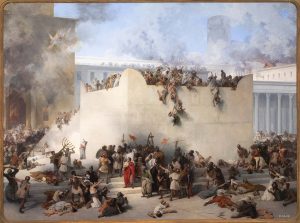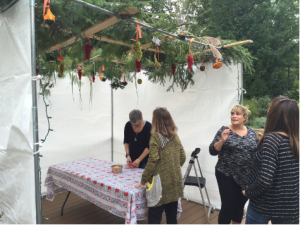Here we are, Celebrating Simchat Torah and welcoming Shabbat, but even this moment of joy is a challenge. We pray for the hostages to be returned and for peace.
Peri Smilow shares Debbie Friedman’s Those Who Sow based in Psalm 126.
Shabbat Shalom
Here we are, Celebrating Simchat Torah and welcoming Shabbat, but even this moment of joy is a challenge. We pray for the hostages to be returned and for peace.
Peri Smilow shares Debbie Friedman’s Those Who Sow based in Psalm 126.
Shabbat Shalom

We spend a lot of time talking about Clal Yisrael or Am Israel, the unity of the Jewish people, the fantastic idea that we are all one. However, it’s never seemed to be the case that everyone who claims Jewish identity considers themselves part of this group. We seem to be very easily swayed into looking at denominations and other forms of Jewish practice as false or authentic and often just plain old wrong.
We don’t have a creed; we have something called Halacha. We practice and interpret the law very differently. This is, historically, a source of strength, allowing our tradition to evolve and be organic, but it’s also been the source of a lot of fighting. It creates a very fractious “people.” Indeed, I wonder if Clal Yisrael is a misnomer. However, from the outside, it is a different story.
When others on the outside look, they see Jews. They do not make distinctions between religious Jews, secular Jews, Zionist Jews, orthodox Jews, and the like; to them, it’s just Jews. We’ve seen that mainly through the world’s antisemitism, the Jew-hatred that unites us from the outside.
This brings me to the idea of Sinat Chinam, the concept of “baseless hatred” that we often use as the reason for the internal friction leading to the downfalls of the first and the second temple. It sounds lofty, radical, and extreme. It’s easy for most of us to talk about it as a foreign object and disclaim any connection to it. We believe we are not so strident while at the same time criticizing those who do not practice Judaism as we do. But that is precisely what our sages were talking about when discussing the concept. It’s not some deeply ingrained hatred of another denomination but our inability to accept that your Judaism is as authentic and valid as my Judaism. Your practice is a true expression of your understanding of our faith tradition. As is mine.
So it’s about the annoyance. It’s about the intolerance. It’s about the inflexibility. It’s about the idea that because I am right, you must be wrong. This concept was developed by a teacher and friend, Rabbi Brad Hirshfield, in his book “You Don’t Have to Be Wrong for Me to Be Right.” It’s the idea that we can look at each other with understanding and appreciation, even if it’s not how we practice Judaism.
We must find a way to move past our judgment of each other and our intolerance of what we see when it doesn’t comport with what we believe is our tradition’s “proper” practice. The Jewish tent is broad enough to encompass us all.
This Shabbat is different. The feelings of vulnerability evoked by Sukkot underscore October Rain. Shulem Lemmer shares his rendition here.
In these times, when we’re focused on not drowning in the hurricane of hatred and antisemitism, our personal feelings often take a backseat. Since that dreadful day in October, our hearts and minds have been solely focused on our land and people. From the moment I heard this song, I felt compelled to cover it, as it conveyed so much of what we’ve struggled to express in recent months. (continued below).
Shabbat Shalom
The original “October Rain” was deemed “too political” for the world stage, leading to the release of a more neutral version, “Hurricane.” I am sharing “October Rain” in its raw, authentic form to voice our nation’s true sentiments. May the floods dry up with the warm sunshine of Moshiach’s arrival!
Lyrics: Writers of the history Stand with me Look into my eyes and see People go away but never say goodbye Someone stole the moon tonight Took my light Everything is black and white Who’s the fool who told you boys don’t cry? Hours and hours and flowers Life is no game for the cowards Why does the time go wild Every day I’m losing my mind Holding on in this mysterious ride Dancing in the storm We got nothing to hide Take me home And leave the world behind And I promise you that never again I’m still wet from this October rain October rain Living in a fantasy Ecstasy Everything is meant to be We shall pass but love will never die Hours and hours and flowers Life is no game for the cowards Why does the time go wild Every day I’m losing my mind Holding on in this mysterious ride Dancing in the storm We got nothing to hide Take me home And leave the world behind And I promise you that never again I’m still wet from this October rain October rain October rain
לא צריך מילים גדולות רק תפילות אפילו כשקשה לראות תמיד אתה משאיר לי אור אחד קטן
 We are about to begin the holiday of Sukkot. From My Jewish Learning, this is an overview of the holiday:
We are about to begin the holiday of Sukkot. From My Jewish Learning, this is an overview of the holiday:
Beginning five days after Yom Kippur, Sukkot is named after the booths or huts (sukkot in Hebrew) in which Jews are supposed to dwell during this week-long celebration. According to rabbinic tradition, these flimsy sukkot represent the huts where the Israelites dwelt during their 40 years of wandering in the desert after escaping from slavery in Egypt. The festival of Sukkot is one of the three great pilgrimage festivals (chaggim or regalim) of the Jewish year.
Here is the link to the full article: https://www.myjewishlearning.com/article/sukkot-101/
By using the Sukkah, we glimpse the experience of our vulnerability.
And this moment of vulnerability requires us to think of those held captive. We pray for and demand the release of the hostages.
We are told to eat at least one meal in the Sukkah. On a lovely fall evening, you can see the stars through the Skach, covering the top. But on cold or rainy evenings, it is another entirely different experience, and we certainly get the message of being vulnerable! (By the way, our great sage, Maimonides, suggests strongly that when it’s rainy, go inside!)
One of the interesting aspects of “dwelling in the Sukkah” is the ritual of inviting the Ushpizin. These are our revered forebears with whom we’d love to talk and glean some of their wisdom. It started with Abraham, Isaac, Jacob, Joseph, Moses, Aaron, and King David. It is extended to include the great matriarchs Sarah, Miriam, Deborah, Hannah, Abigail, Huldah, and Esther. And it is a chance to broaden the guest list even further. I have invited loved ones, particularly my great-grandfather. Who is on your guest list?
As we approach Yom Kippur and Shabbat, may we receive forgiveness and forgive.
W all pray for the hostages to return home and for peace in 5785.
Gmar Chatima Tova and Shabbat Shalom
October 7 marks the solemn first anniversary.
These are the individuals we have lost. If you are blessed not to need to attend Yizkor services for lost loved ones this year, show up to share a moment of remembrance for these souls.
https://www.timesofisrael.com/those-we-have-lost/
Shabbat Shuva, the Shabbat of Return, is the Shabbat between Rosh HaShannah and Yom Kippur.
Nesshama Carelbach’s beautiful rendition of her father’s song is a wonderful way to welcome us to this special time.
Close your eyes and become a part of this meditative experience.
G’mar chatima tova, May you have a good seal- May it be a year of health and blessing.
We welcome Shabbat with the song Shalom Aleichem, May Peace be upon you.
It is a message brought by the Angels of the Divine and a way for us to greet each other.
May this Shabbat be one of peace.
Shabbat Shalom
In response to the 1973 Yom Kippur War and inspired by the Beatles, Let It Be, Naomi Shemer created Lu Yehi, Let it be.
This Shabbat, we continue to pray for the hostages to come home, and for the bloodshed to stop.
Shabbat Shalom
Bring them Home
We ache for the day when our people are returned home when all can be held in the arms of loving family. Let us work for this day, let us pray for this day. Peace cannot come soon enough.
Josh Groban shares his gift with us, sending our prayers heavenward.
Shabbat Shalom
#BringThemHome